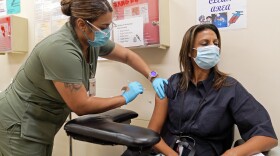
Rob Stein
Rob Stein is a correspondent and senior editor on NPR's science desk.
An award-winning science journalist with more than 30 years of experience, Stein mostly covers health and medicine. He tends to focus on stories that illustrate the intersection of science, health, politics, social trends, ethics, and federal science policy. He tracks genetics, stem cells, cancer research, women's health issues, and other science, medical, and health policy news.
Before NPR, Stein worked at The Washington Post for 16 years, first as the newspaper's science editor and then as a national health reporter. Earlier in his career, Stein spent about four years as an editor at NPR's science desk. Before that, he was a science reporter for United Press International (UPI) in Boston and the science editor of the international wire service in Washington.
Stein's work has been honored by many organizations, including the National Academy of Sciences, the American Association for the Advancement of Science, the American Association for Cancer Research, and the Association of Health Care Journalists. He was twice part of NPR teams that won Peabody Awards.
Stein frequently represents NPR, speaking at universities, international meetings and other venues, including the University of Cambridge in Britain, the World Conference of Science Journalists in South Korea, and the Aspen Institute in Washington, DC.
Stein is a graduate of the University of Massachusetts, Amherst. He completed a journalism fellowship at the Harvard School of Public Health, a program in science and religion at the University of Cambridge, and a summer science writer's workshop at the Marine Biological Laboratory in Woods Hole, Mass.
-
The Department of Health and Human Services is ending a $766 million contract with the vaccine company Moderna to develop an mRNA vaccine for flu strains with pandemic potential, including bird flu.
-
Federal officials unveiled a rigorous regulatory approach to future COVID vaccines that could make it harder for many people under 65 to get immunized.
-
Vaccines for a fall immunization drive against COVID-19 just got the green light from the Food and Drug Administration. The agency says the vaccines can protect people, as hospitalizations tick up.
-
The new approach would simplify vaccination guidance so that, every fall, people would get a new shot, updated to try to match whatever variant is dominant.
-
RSV and the flu appear to be receding in the U.S., but COVID is on the rise, new data suggests, driven by holiday gatherings and an even more transmissible omicron subvariant that has become dominant.
-
As the holiday approaches, infectious disease specialists are bracing for the possibility that big family get-togethers and travel will propel the spread of RSV, flu and COVID-19.
-
The new shots from Moderna and Pfizer-BioNTech target both the original strain of the coronavirus and the omicron BA.4/BA.5 subvariants that most people are catching now.
-
Some scientists are alarmed that the agency plans to evaluate the next generation of boosters by reviewing mouse studies alone. Others say there's no time to waste waiting for human trials.
-
The Biden administration is scrapping plans to offer COVID boosters for people under 50 this summer. Instead officials will push for an earlier release of the next generation boosters in the fall.
-
The Biden administration may scrap plans to expand eligibility for second boosters to younger adults. Instead, it's trying to speed up the next generation of boosters targeting the omicron variant.










